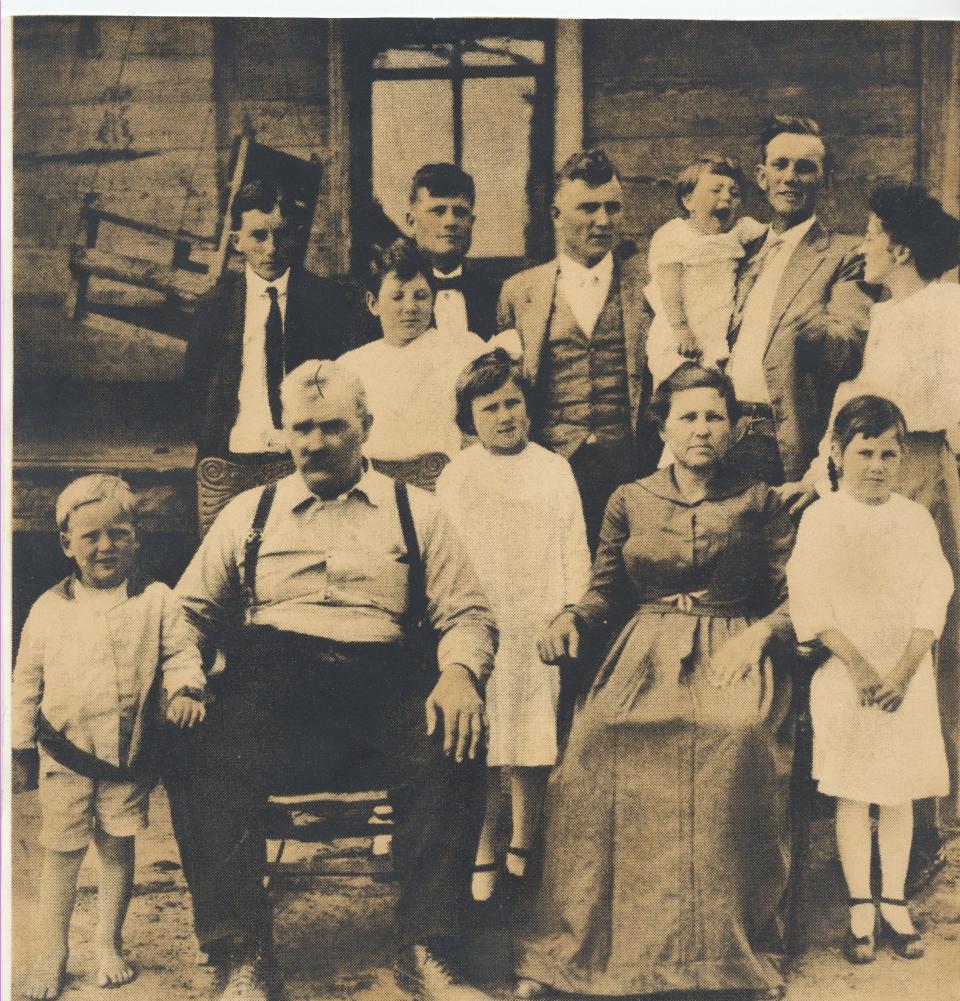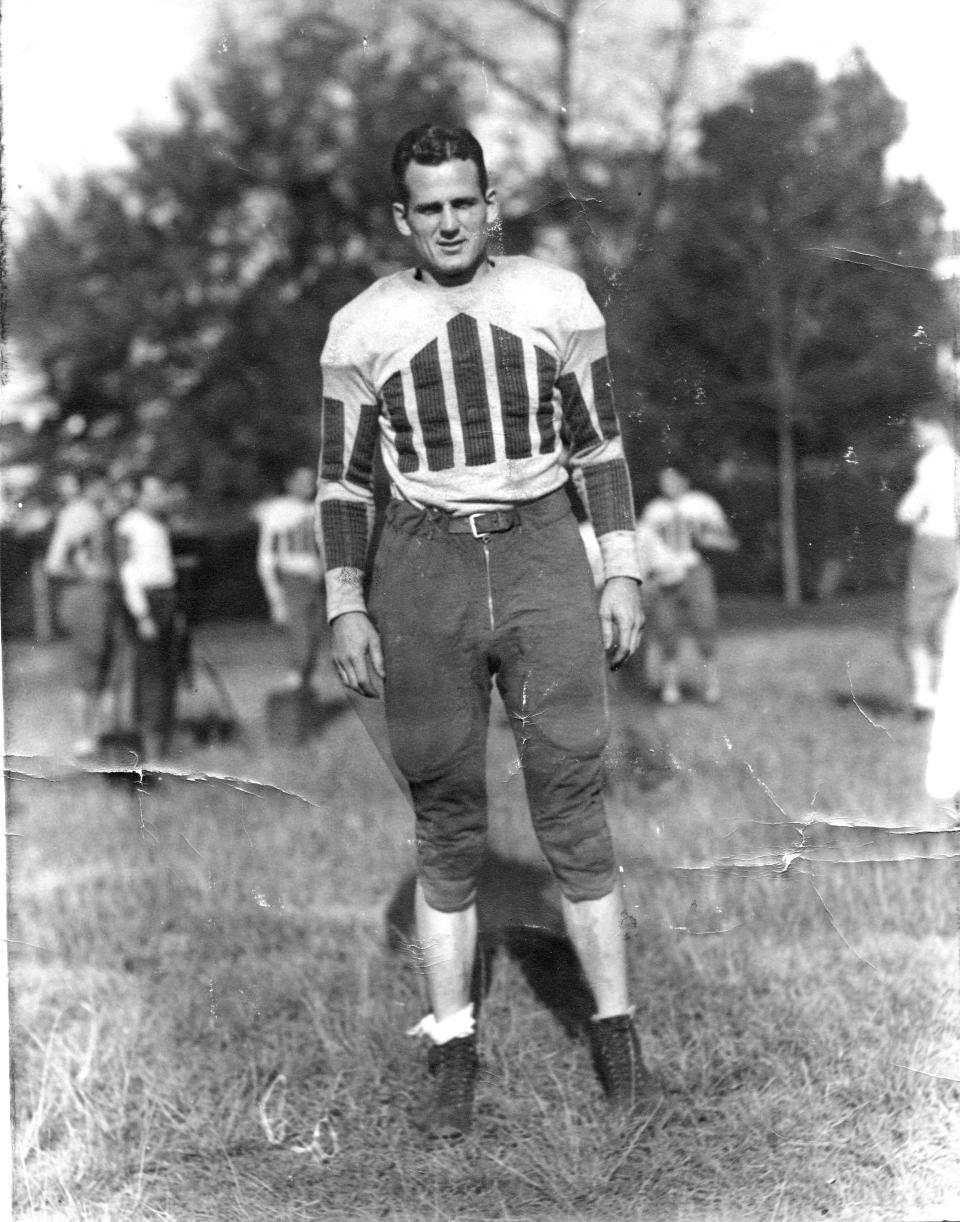The 'Bear' at 110: Paul W. Bryant was born Sept. 11, 1913
In rural Cleveland County, Arkansas, William Monroe and Ida Kilgore Bryant welcomed a newborn son into their family 110 years ago.
That son would grow up to become a legendary college football coach, leading the University of Alabama to six national championships, 24 bowl games, 13 conference titles, and three undefeated seasons.
More: What was 'Bear' Bryant's retirement plan? It involved the Red Sox and Penn State football
On the anniversary of his birth, here's a look back at the life of Paul William "Bear" Bryant:
September 11, 1913 – Paul William Bryant is born in Moro Bottom, Arkansas.

1927 – A teenaged Bryant agrees to wrestle a bear in Fordyce, Arkansas, for a dollar a minute. This event leads to the nickname “Bear,” which he carries throughout his life.
1930 – Fordyce High School completes a perfect season with an Arkansas state championship win. Bryant played offensive line and defensive end.
September 30, 1933 – Bryant makes his college debut at Alabama in the season opener against Oglethorpe. The Crimson Tide wins 34-0.
November 30, 1933 – Alabama beats Vanderbilt 7-0 to complete a 7-1- 1 season and win the SEC championship in the conference’s first year of existence.
January 1, 1935 – Alabama defeats Stanford 29-13 in the Rose Bowl to claim the school’s fourth national championship. Bryant is the Crimson Tide’s “other end,” playing opposite future Hall of Famer Don Hutson.

June 2, 1935 – Bryant marries Mary Harmon Black, a native of Troy, Alabama.
October 19, 1935 – Alabama beats rival Tennessee 25-0 in Knoxville. Bryant plays in the game despite a broken bone in his right leg.
1936 – Bryant becomes an assistant on Frank Thomas’ staff at Alabama, where he works through the 1939 season. The Crimson Tide goes 8-0- 1 that first season but is not invited to a bowl game.
1940-41 – Bryant spends two seasons as an assistant coach at Vanderbilt under Red Sanders. The Commodores go 11-8- 1.
December 7, 1941 – Bryant is driving back to Vanderbilt after interviewing to become Arkansas’ head coach when he hears Pearl Harbor is bombed. Bryant joins the Navy at 28 years old to serve in the war.
![Paul 'Bear' Bryant was deployed to North Africa with the Navy in 1942 and was granted an honorable discharge in 1944. [Bryant Museum]](https://s.yimg.com/ny/api/res/1.2/W7RFI.Dsfcb5j114SiWO8Q--/YXBwaWQ9aGlnaGxhbmRlcjt3PTk2MDtoPTEzMjA-/https://media.zenfs.com/en/the-tuscaloosa-news/5b15e4427b9937d7b1aeaae63782a272)
1942 – Bryant spends a season as an assistant at Georgia Pre-Flight, a program made of players waiting to begin pilot training in the Navy. The team goes 7-1.
1942-44 – Bryant is deployed to North Africa with the Navy.
February 12, 1943 – Troop transport SS Uruguay is accidentally rammed by a friendly oil tanker with Bryant among 5,000 troops aboard. The ship reaches harbor three days later.
1944 – The Navy grants Bryant an honorable discharge so he can be an assistant with the Navy’s North Carolina Pre-Flight football team. They finish 6-2- 1.
September 28, 1945 – Bryant makes his head coaching debut as a 32-year- old at Maryland. The Terrapins go 6-2- 1 that season after winning one game in 1944. The roster features several players from the recently-dissolved North Carolina Pre-Flight team.
1946 – Bryant leaves Maryland after one year following a conflict with university president Curley Byrd. He becomes head coach at Kentucky.
December 6, 1947 – Kentucky reaches its first bowl game in school history, defeating Villanova 24-14 in the Great Lakes Bowl to cap an 8-3 season.
January 1, 1951 – The Wildcats beat Oklahoma 13-7 in the Sugar Bowl to complete an 11-1 season and end a 31-game win streak for the Sooners. Kentucky wins its first SEC championship and claims a national championship, though the claim is disputed.
February 8, 1954 – Bryant arrives in College Station, Texas, to become head coach at Texas A&M.
September 1, 1954 – The Aggie football team begins a 10-day preseason camp near Junction, Texas, under Bryant’s direction. Many players quit the team during the camp as a result of long practices and oppressive heat. Two players who complete the camp are Jack Pardee and Gene Stallings.
1954 – Texas A&M finishes 1-9 in Bryant’s first season. It is the only losing season of his head coaching career.
December 3, 1957 – Texas A&M back John David Crow wins the 1957 Heisman Trophy. He is the only player under Bryant to win the award.

December 27, 1957 – Bryant finishes his fourth year at Texas A&M 8-3. In his four years, the Aggies go 25-14- 2, including 9-0- 1 in his third year.
1958 – Bryant returns to Tuscaloosa as head football coach of the University of Alabama. The Crimson Tide goes 5-4- 1 in his first season and misses a bowl game, but improves after going 4-24- 2 in the three years before he arrived.
January 1, 1962 – Bryant’s team is unbeaten and untied in his fourth season, finishing the year with a win over Arkansas in the Sugar Bowl. He wins his first national championship as head coach and the program’s sixth title.
September 22, 1962 – Alabama beats Georgia 35-0 in a game The Saturday Evening Post alleges in an article published March 23, 1963 the game was fixed by Bryant and Georgia athletic director Wally Butts. Butts later sues the Post and wins a landmark defamation case. Bryant settles his case out of court.

1964 – Alabama wins the national championship after going 10-1 with its only loss coming against Texas in the Orange Bowl. It is Bryant’s second championship as coach and the program’s seventh.
January 1, 1966 – Alabama finishes the 1965 season 9-1- 1 with a win over Nebraska in the Orange Bowl to claim the program’s eighth national championship, winning the title in back-to- back years. It is Bryant’s third as head coach.
January 2, 1967 – Alabama defeats Nebraska in the Sugar Bowl to finish the season. Despite being the only college football team to be unbeaten and untied, Alabama is not awarded the national championship. Michigan State and Notre Dame each claim the title.
1971 – John Mitchell and Wilbur Jackson become the first African-American players to play in a game at Alabama under Bryant.
September 10, 1971 – Alabama opens its season with a 17-10 win over No. 5 Southern Cal in Los Angeles. The Crimson Tide debuts its new “wishbone” offense, which Bryant had secretly installed in the offseason.
January 1, 1972 – Undefeated Alabama loses the Orange Bowl to No. 2 Nebraska, giving the Cornhuskers the national championship.
1973 – Alabama wins the national championship with an 11-1 season, despite losing to Notre Dame in its bowl game. It is Bryant’s fourth national championship as head coach and the ninth claimed by the school.
January 1, 1979 – Alabama completes the 1978 season with a 14-7 win over Penn State in the Sugar Bowl. The Crimson Tide is 11-1 overall, winning Bryant’s fifth national championship as coach and the school’s 10th title.

January 1, 1980 – The Crimson Tide clinches back-to- back national championships with a 24-9 win against Arkansas in the Sugar Bowl. Alabama finished 12-0 to win Bryant’s sixth and final national championship as coach. It is the program’s 11th championship.
November 28, 1981 – Bryant becomes college football’s all-time winningest coach with his 315th victory. He passes Amos Alonzo Stagg in a 28-17 win over Auburn in the Iron Bowl.
December 15, 1982 – Bryant announces he will retire at the end of the season.
December 29, 1982 – Alabama defeats Illinois 21-15 in the Liberty Bowl in Memphis in Bryant’s final game. It’s Alabama’s 24th consecutive bowl game. Bryant finishes his career 323-85- 17 overall.
January 26, 1983 – Bryant passes away at Druid City Hospital after suffering a heart attack. He was 69.
This article originally appeared on The Tuscaloosa News: The 'Bear' at 110: Coach Paul W. Bryant was born Sept. 11, 1913

